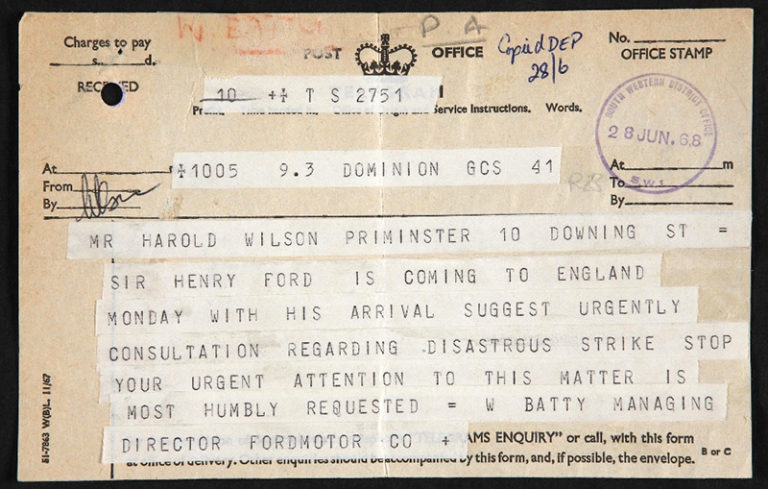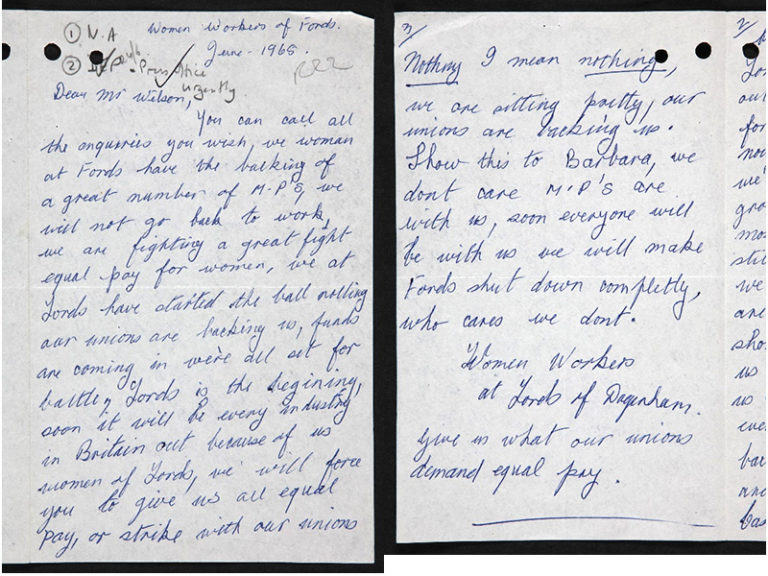The Archivists’ Guide to Film
The Archivists’ Guide to Film is a blog series in which staff at The National Archives write about favourite films that have a connection to documents held at The National Archives. These films cover a wide range of topics and historical periods, from the Second World War to key moments in social history.
So settle down with your snack of choice and get ready to brush up on your film and history trivia knowledge. You’ll be ready when the pub quiz makes its return…
The first film in our series, Made in Dagenham (2010) directed by Nigel Cole, focuses on a fictional character named Rita O’Grady, played by the always-amazing Sally Hawkins. Rita finds herself thrust into the role of an activist, when her fellow sewing machinists at the Ford plant in Dagenham choose her to lead their collective fight for equal pay.
The film is based on the 1968 Ford sewing machinists’ strike, where a group of women refused to work until they were granted recognition for the quality of their labour. The strike led to the Equal Pay Act, which was established in 1970.
The action began on 7 June 1968, when 187 women walked out of Ford’s Dagenham plant, led by several key women: Rose Boland, Eileen Pullen, Vera Sime, Gwen Davis and Sheila Douglass. Prime Minister’s Office files on this subject, notably fraught telegrams alongside a handwritten letter signed the ‘Women Workers at Lords of Dagenham’, reveal the extent of government tensions. These women really did strike fear into the hearts of political leaders, who were worried about the financial impact of the strike and feared the strike might spread.

Contrary to popular belief, the women at Dagenham were not asking directly for equal pay; they were asking that their technical skills used to make seat covers be ranked at the same grade as their fellow male workers.
Telegrams from the government stated that the production of 2,200 cars had halted, causing the cancellation of export orders worth more than £8 million. The women state in their letter that they are sorry for the disruption to the men’s work ‘but more sorry for ourselves’. These women workers boldly declare in their letter that ‘We are fighting a great fight: equal pay for women’.
In the end, the women did not achieve their initial goal; the grading of their work did not change. However, their activism was fundamental to Barbara Castle passing the Equal Pay Act in 1970, for which women had been fighting for decades. This was a particularly prominent moment in the fight for equal pay, but it had been a long-held demand of women’s movements. As the women of Dagenham stated in their letter, this fight was for ‘not only us at Fords, but [for] all women everywhere’.

What makes the film so good is Sally Hawkins’ understated performance, an engaging script that’s peppered with sassy banter between the factory workers, friends and couples, and an authentic depiction of male-female working relationships in this period. O’Grady’s character development is cleverly crafted – what starts as a highly self-possessed and internalised awareness of inequality develops subtly and realistically into her willingness to lose everything for her cause.
The film does a great job of demonstrating how women were expected to support their partners as the primary bread-winners, and how no one expected them to push back when their requests were ignored. This truly was a groundbreaking historical moment for women’s rights.